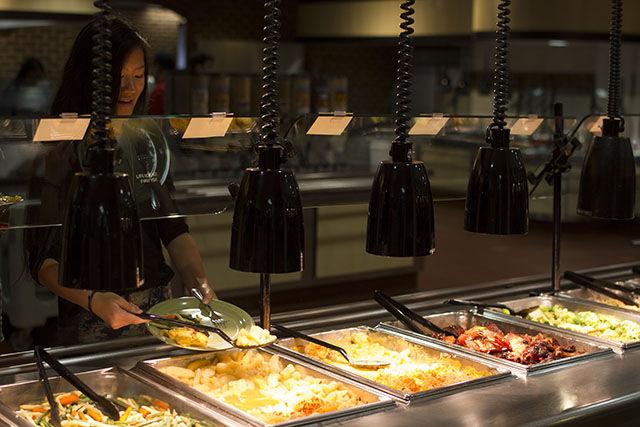
Ben Leeds
A student grabs cinnamon apples from the line at Fountain Dining Hall Aug. 25.
University Dining has increased its amount of food sourced from North Carolina and South Carolina from 18 percent to 28 percent in the past two years, while also making people aware of the benefits of these sources.
University Dining Purchasing Manager James Raynor said the university tries to purchase North Carolina-grown food whenever possible.
“There are some items that North Carolina doesn’t grow,” Raynor said. “They don’t grow bananas, they don’t grow pineapples. There are only certain times of the season you can get strawberries, but whenever possible, we make an effort to buy local through our prime vendor or other sources.”
University Dining is under contract with its prime vendor, US Foods, until 2018. US Foods is a national company, but it has a warehouse in Zebulon, North Carolina. Raynor said the university works with US Foods to purchase as much North and South Carolina grown produce as possible at a competitive price.
The My Roots campaign is one of several programs NC State is involved in to help promote area-grown food, as well as meals such the All Carolinas Meal and the Earth Day Meal.
The My Roots Campaign was started about two years ago to highlight alumni and their contributions to food in North Carolina.
“We’re just trying to tie the university back to North Carolina food, back to the dining halls,” said University Dining Sustainability Coordinator Christopher Dunham. “Just kept trying to bridge all that gap, make that connection.”
The All Carolinas Meal was first held in 2004, and since then has become an annual event. The All Carolinas Meal and the Earth Day Meal highlight North and South Carolina food sources.
“For those events we focus on not so much the budget but the atmosphere and the local food,” Dunham said. “All the main dishes had one local ingredient at least.”
Dunham said On the Oval on Centennial Campus recently started a rooftop garden. He said On the Oval will be a focal point in the future.
Although University Dining already uses many North Carolina-based food sources, it is always searching for other companies to increase its percentage North Carolina-sourced food.
Even though some products, such as coffee beans and wheat, cannot be grown in North Carolina, NC State still tries to use companies based out of North Carolina. One of the companies it uses is Neomonde Baking Company located in Morrisville. The university purchases approximately 88 percent of its fresh bread from Neomonde.
Brookwood Farms Barbeque is the source of NC State’s barbecue. A few of the employees of Brookwood are NC State alumni, and Brookwood offers a competitive price and a good product, according to Raynor.
University Dining isn’t the only one campaigning for more food close to home. Raynor said when University Dining first started purchasing from US foods in 1999, it didn’t label the sources of its products, but now locations of many of its products can be found on its website.
The biggest challenges with purchasing food from North Carolina vendors is finding sources able to satisfy the quantities of food that NC State demands and finding sources with prices to fit NC State’s budget.
“We’re constantly looking for local, and to get that at the best possible price and whenever we have a choice and the things are similar, we’ll pick local,” Raynor said.
The benefits of using North Carolina-grown food include healthier, fresher food and helping the North Carolina economy.
Dunham said student opinion had a big influence on the movement toward purchasing North Carolina-grown food.
“[For] a lot of students, it’s not their biggest priority, which is understandable,” Dunham said. “But for the students that really want to see local, and we as a university, we really want to make North Carolina flourish, economically. Putting that back into the economy is really important to us.”